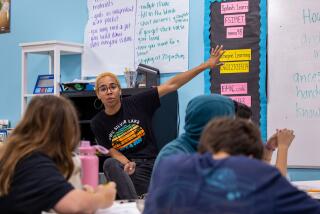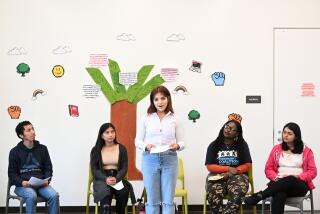Bennett’s Report Card
- Share via
Education Secretary William Bennett lamented in his article (Editorial Pages, Sept. 2) the fact that a surprising percentage of our high school juniors lacked much basic knowledge of history and geography. On the same page Franklin Garfield describes his daughter’s resistance to his efforts to further her education at home. In frustration, his home curriculum has been condensed to merely having her look up and learn one word a day. Even that she considers “a monstrous intrusion on her time.”
As one who has faced and dealt with classrooms of high school students for the past 21 years, I applaud Garfield’s efforts. But I can also state that his daughter’s resistance to acquiring what we adults call basic knowledge is unfortunately not at all untypical of today’s teen-agers.
Don’t misunderstand me; I am not putting them down. These young people are a lot sharper than what we adults give them credit for being. Today the gap between the teen-age and adult societies is wider than ever. We know that our values conflict, but most of us adults are unaware of how much they conflict.
The reasons for this are vast and complex, but two stand out in my educator’s mind. We taught them to ask why, and we have given them plenty of reasons why they do not want to think about their futures.
Post-Sputnik education taught our children to question why things work, why events happened, and why they do what they do. Today’s youngsters ask their teachers, “Where or when will I use it?” And they demand answers that are meaningful and relevant to them.
We have poorly answered these questions; we mostly have phrased our responses in terms of some needs in their distant futures. To them we are saying, “Take our word for it, you’re going to need to know it.”
I can’t say that young people are afraid of the future, but most are very reluctant to make important decisions regarding their futures. “I’ll deal with it when the time comes” seems to be the prevalent attitude. Others have unrealistically rosy expectations.
We educators and parents have to do a better job dealing with the future ourselves. Our children are aware of the potential nuclear holocaust, our $2-trillion debt, and the growing threat of U.S. military involvement in Central America. They have legitimate fears!
More immediately we must find ways to convince these young people that they need their education now, and that knowledge itself can produce a wonderful high.
GEORGE SCHROEDTER
La Verne






